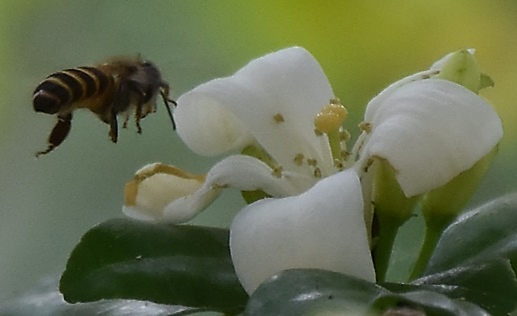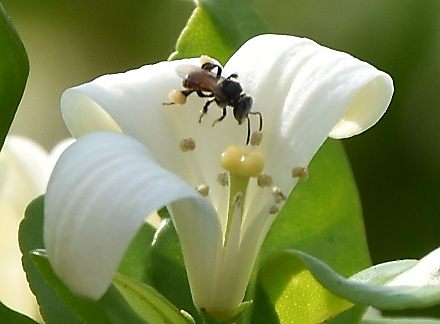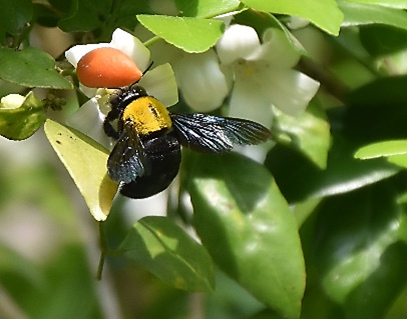The Buzzing Saviours: How Bees might hold the key to productivity and resilience in Ben Tre
by Tarun Bisht, Oanh Truong, Khang Le, Oanh Ho, Truc Duong, Loi Nguyen, Quang Vo
Can ecosystems in Bến Tre, a province of the Mekong Delta, Vietnam, provide a range of ecosystem services to local habitants? We surveyed people across a range of communes about their experiences of organic farming, beekeeping, and their knowledge of threats to pollination, a vital ecosystem service. Focussing on livelihood practices that improve pollination, we explored whether pollination has the capacity to make these socio-ecological systems more resilient in the face of climate change.
Flowers, Bees and Pollination
The sweet scent of jasmine filled the air as we strolled through a commune of north-west Bến Tre Province in the Mekong Delta early in the morning. Bees were swarming around the flowers, especially the flowering coconut, mango, mangosteen, and durian fruit trees. It was a remarkable sight serving as a reminder of the crucial role that bees and other pollinators like birds, butterflies, and some wasps, play within ecosystems.
Pollination is a vital ecosystem service, which works in synergy with other ecosystem services, such as fruit and plant production, carbon storage, biodiversity, and many more. It enables the orchards of Bến Tre to flourish. Trees in this region rely on pollinators for successful cross-pollination, leading to bumper harvests. The locals here understand this fact very well and cultivate flowering plants in their gardens to attract these industrious insects. The beautiful flowering plants also add a touch of charm to their homes.



During our visit we observed different species of bees including Carpenter bees, locally known as ‘Ong Bau’, Honeybees, known as ‘Ong Mat’, and Dwarf honeybees, known as ‘Ong Ruoi’, each varying in size from a few millimetres to centimetres.
According to locals, these bees prefer nesting on taller coconut trees and leaves, whilst avoiding the dwarf variety of coconut tree (Xiem). They can also be found nesting on like electricity poles and roofs.
Threats to Bee populations
The bee population and rate of pollination in Bến Tre is under threat. More intense and longer lasting heatwaves, alongside increased and excessive use of pesticides and insecticides, as well as the destruction of hives through unsustainable honey extraction practices (i.e., destroying or burning the full hive) are all contributing factors.
There is a stark difference in insect biodiversity between areas using excessive pesticides, insecticides and those practicing organic farming. Though many people believe that the chemicals used are a necessary evil – a means to achieve a higher yield, they recognise that this has inadvertently led to a decline in the pollinator population, which is severely concerning for Bến Tre’s agriculture and horticultural practices.
Many of the affected areas grow ornamental plants, sold exclusively during Tết Nguyên Đán (TET), also known as Lunar New Year, Vietnam’s largest cultural festival. By adopting livelihood practices which reduce chemical use and encourage better pollination, the rich cultural heritage of the festival can be enhanced.
Potential of Beekeeping and Organic farming
Beekeeper shows us a bee box harbouring a bee colony (left); A beehive (right). (Tarun Bisht)
Beekeeping (albeit in lower numbers) still thrives in a few communes of Bến Tre, particularly in the fruit-growing regions.
We met a beekeeper, who originally began beekeeping as a hobby, and in just 3 years, grew his bee farm from just 2 bee boxes to over forty. A single one of his bee boxes typically produces one litre of honey at any given time of harvest, yet honey production is often lower in the rainy season.
“Beekeeping is highly productive in orchard areas growing jackfruits, longan, coconut, mango, and banana […] honey production is often lower in the rainy season and increases during the summer when there are more flowers for bees to forage”
He told us he was aware of the ill effects of pesticides and insecticides on bees, so he only uses organic methods to grow fruit trees around his garden. He recommends that locals interested in beekeeping plant more flowering plants and ensure proper cleanliness of bee boxes to prevent disease outbreaks.
An organic vegetable farm with interspersed flower plants. (Tarun Bisht)
A butterfly feeding on the flower’s nectar in the farm. (Tarun Bisht)
Some communes in Bến Tre have transitioned to more sustainable livelihood options like organic farming of vegetables.
This shift has been influenced by the help of a Japanese NGO collaboration, which trained farmers and encouraged them how to grow a variety of vegetables using vermicompost manure, as well as helping them to understand the role that bees and other pollinators, such as birds and butterflies play in achieving higher yields. The farmers were also advised to plant flowering bushes interspersed within their vegetable plants to attract maximum pollinators.
Mitigating threats to Pollination in Bến Tre
Beekeeping and organic farming have enormous potential and with its diverse habitat Bến Tre offers ample foraging and nesting opportunities for bees. The conservation and enhancement of pollination services can yield multiple benefits, such as improving the quality and boosting the yields of the region’s orchards, vegetables, and ornamental plants. The latter has relevance for cultural- heritage events, such as the TET, as these plants are sold and bought majorly around that period due to its cultural significance.
The excessive use of pesticides and insecticides threatens pollinator populations, as well as the livelihoods and wellbeing of local people, and if left unchecked, could lead to the collapse of the region's orchard growing regions.
To prevent this collapse, promoting and enhancing beekeeping, together and in synergy with organic farming methods is vital. Encouragement from authorities, alongside detailed guidelines for farmers is essential.
Encouraging organic farming and beekeeping will also inadvertently work in synergy to boost several other ecosystem services, such as biodiversity, maintenance of soil health, carbon storage and food production. Moreover, an increase in these activities can contribute to increased overall resilience of Bến Tre’s socioecological systems, specifically in the face of challenges such as prolonged heatwaves and salinity intrusion which threatens the livelihoods and prosperity of the region.
Therefore, by taking action to promote beekeeping and organic farming methods, we can create and encourage sustainable livelihoods, whilst also preserving the unique socio-ecological systems that make Bến Tre such a special place.
Want to stay up to date with the Hub’s latest research? Why not sign up for our newsletter?



